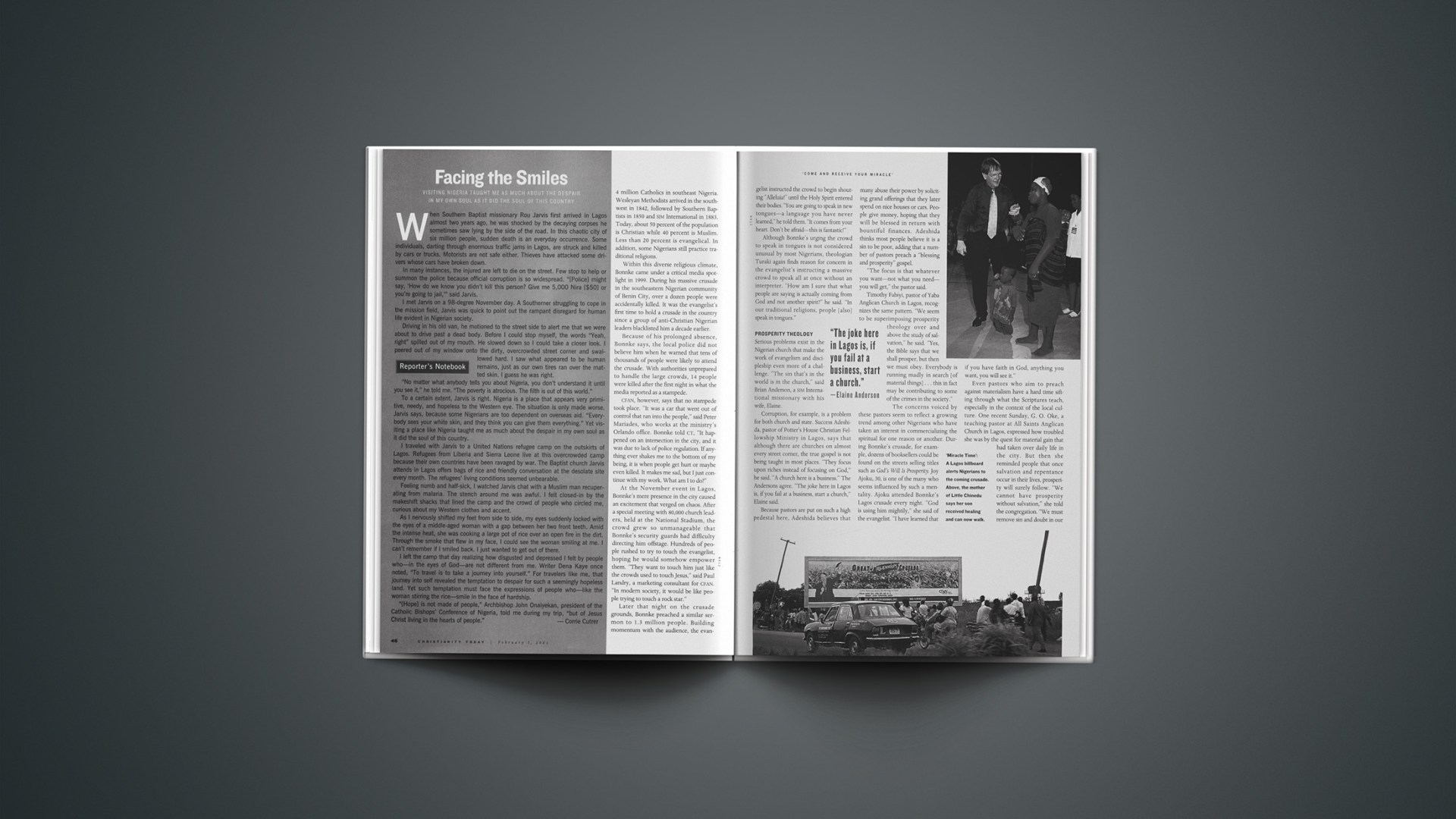In many instances, the injured are left to die on the street. Few stop to help or summon the police because official corruption is so widespread. “[Police] might say, ‘How do we know you didn’t kill this person? Give me 5,000 Nira [$50] or you’re going to jail,'” said Jarvis.
I met Jarvis on a 98-degree November day. A Southerner struggling to cope in the mission field, Jarvis was quick to point out the rampant disregard for human life evident in Nigerian society.
Driving in his old van, he motioned to the street side to alert me that we were about to drive past a dead body. Before I could stop myself, the words “Yeah, right” spilled out of my mouth. He slowed down so I could take a closer look. I peered out of my window onto the dirty, overcrowded street corner and swallowed hard. I saw what appeared to be human remains, just as our own tires ran over the matted skin. I guess he was right.
“No matter what anybody tells you about Nigeria, you don’t understand it until you see it,” he told me. “The poverty is atrocious. The filth is out of this world.”
To a certain extent, Jarvis is right. Nigeria is a place that appears very primitive, needy, and hopeless to the Western eye. The situation is only made worse, Jarvis says, because some Nigerians are too dependent on overseas aid. “Everybody sees your white skin, and they think you can give them everything.” Yet visiting a place like Nigeria taught me as much about the despair in my own soul as it did the soul of this country.
I traveled with Jarvis to a United Nations refugee camp on the outskirts of Lagos. Refugees from Liberia and Sierra Leone live at this overcrowded camp because their own countries have been ravaged by war. The Baptist church Jarvis attends in Lagos offers bags of rice and friendly conversation at the desolate site every month. The refugees’ living conditions seemed unbearable.
Feeling numb and half-sick, I watched Jarvis chat with a Muslim man recuperating from malaria. The stench around me was awful. I felt closed-in by the makeshift shacks that lined the camp and the crowd of people who circled me, curious about my Western clothes and accent.
As I nervously shifted my feet from side to side, my eyes suddenly locked with the eyes of a middle-aged woman with a gap between her two front teeth. Amid the intense heat, she was cooking a large pot of rice over an open fire in the dirt. Through the smoke that flew in my face, I could see the woman smiling at me. I can’t remember if I smiled back. I just wanted to get out of there.
I left the camp that day realizing how disgusted and depressed I felt by people who—in the eyes of God—are not different from me. Writer Dena Kaye once noted, “To travel is to take a journey into yourself.” For travelers like me, that journey into self revealed the temptation to despair for such a seemingly hopeless land. Yet such temptation must face the expressions of people who—like the woman stirring the rice—smile in the face of hardship.
“[Hope] is not made of people,” Archbishop John Onaiyekan, president of the Catholic Bishops’ Conference of Nigeria, told me during my trip, “but of Jesus Christ living in the hearts of people.”
Copyright © 2001 Christianity Today. Click for reprint information.
Related Elsewhere
Today’s related stories on Nigeria include “‘Come and Receive Your Miracle’” and “The Shari’ah Threat.”Cutrer also filed reports from the field while she was in Nigeria in November 2000 detailing one of the largest recorded gatherings ever, with more than 6 million in attendance looking for a miracle.
As Christianity Today‘s editorial resident, Cutrer has written several news articles this past year including:
COGIC Presiding Bishop Ousted | Alleged abuse of power leads to historic vote for Church of God in Christ. (Jan. 8, 2001)
The Business of Resurrection | A fast-growing Kansas City church builds on success by using an innovative plan for real-estate development. (Dec. 4, 2000)
Using Wesley’s Old Playbook | Methodism is “perfectly situated to reach Gen-Xers,” says pastor. (Dec. 4, 2000)
Lessons from Two Sides of AIDS | An HIV-positive woman and a wealthy businessman are reminded of God’s expansive love at a unique camp. (Oct. 23, 2000)
Repentance or Propaganda? | At Willow Creek conference, President Clinton reviews his moral failures, details his spiritual recovery. (Oct. 2, 2000)
Longest-Running Radio Show On Earth | At 50, Unshackled! still transforms broken lives. (Aug. 30, 2000)
Baptists on the Block | Southern Baptists work and witness in Chicago street outreach. (July 25, 2000)










